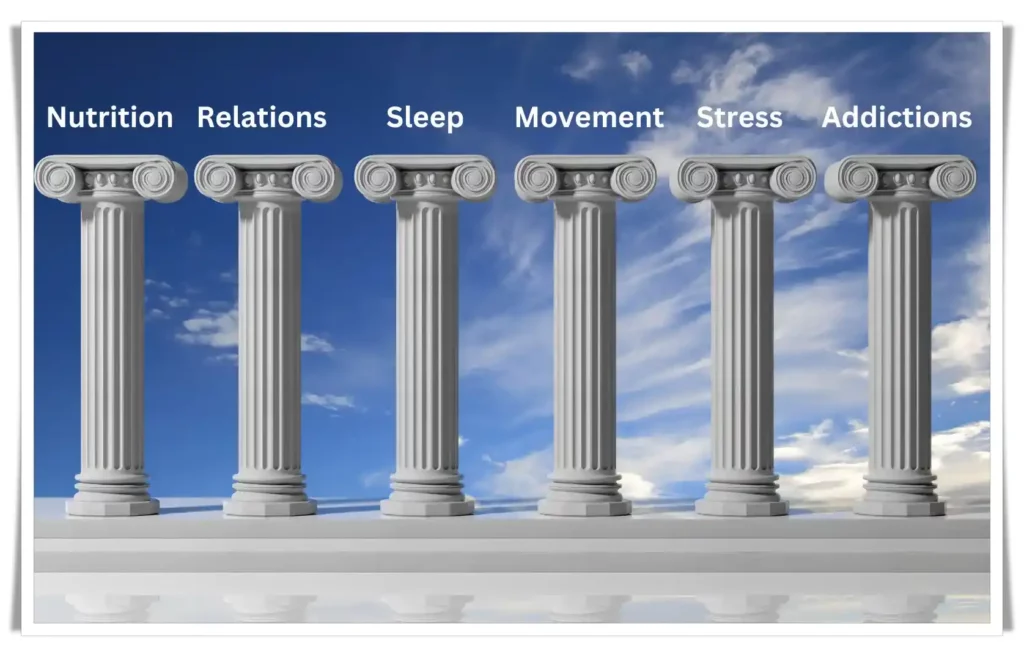Maintaining a healthy lifestyle is much like building a strong and resilient structure. It requires a solid foundation supported by multiple pillars, each playing a crucial role in the overall stability of the whole. In this article, we'll explore the six essential pillars of health: Nutrition, Relationships, Sleep, Movement, Stress Management, and Releasing Addictions. These pillars are interconnected, and neglecting any one of them can cause the entire structure to weaken.
How to Have a Healthy Lifestyle - The Six Pillars of Health
Achieving and maintaining a healthy lifestyle is a journey, not a destination. It involves a balanced approach that goes beyond just focusing on one aspect of health. Like a well-built house, your health needs a strong foundation supported by multiple pillars. Let's dive into each of these six essential pillars of health and explore how they work together to keep you strong, happy, and healthy.
Nutrition

Nutrition is often the first thing that comes to mind when we think about health. What you eat fuels your body and mind, providing the essential nutrients needed to function optimally. However, it's not just about eating your vegetables or avoiding junk food. Nutrition involves making mindful choices that support long-term well-being.
The Role of Nutrition in a Healthy Lifestyle
Good nutrition starts with understanding what your body needs and making informed choices. A diet rich in whole foods like fruits, vegetables, lean proteins, and whole grains provides the essential vitamins, minerals, and antioxidants your body requires.
"The definition of what constitutes a healthy diet is continually shifting to reflect the evolving understanding of the roles that different foods, essential nutrients, and other food components play in health and disease. A large and growing body of evidence supports that intake of certain types of nutrients, specific food groups, or overarching dietary patterns positively influences health and promotes the prevention of common non-communicable diseases (NCDs)." -National Library of Medicine
Avoiding Ultra-Processed Foods
Ultra-processed foods typically have more than one ingredient that you never or rarely find in a kitchen. They also tend to include many additives and ingredients that are not typically used in home cooking, such as preservatives, emulsifiers, sweeteners, and artificial colours and flavours. These foods generally have a long shelf life. (British Heart Foundation)

One of the first steps toward better nutrition is reducing or eliminating ultra-processed foods from your diet. These are foods that are heavily altered from their original form and often contain added sugars, unhealthy fats, and artificial ingredients. They may be convenient, but they contribute little to your nutritional needs and can lead to long-term health issues like obesity, diabetes, and heart disease.
The Importance of Superfoods
Incorporating superfoods into your diet can significantly enhance your health. Superfoods are nutrient-dense and packed with antioxidants, vitamins, and minerals. Examples include berries, leafy greens, nuts, seeds, and fatty fish. These foods help fight inflammation, boost immunity, and provide energy.

The term ''superfood'' refers to foods that contain high amounts of nutrients or antioxidants. There are plenty of these foods out there, but some stand above the rest. They include blueberries, broccoli, kale, spinach, almonds, avocados, salmon, eggs, and red wine. The Best Superfoods For a Healthy Lifestyle
Intermittent Fasting and Mindful Eating
Intermittent fasting is a dietary strategy that involves alternating periods of eating and fasting. Unlike traditional diets, which often involve strict calorie counting and meal planning, IF focuses on when you eat rather than what you eat. There are several different approaches to IF, but the most common ones are time-restricted eating and alternate-day fasting.

Time-restricted eating involves limiting your daily food intake to a specific window of time, typically 6-8 hours, and fasting for the remaining 16-18 hours. For example, you might eat all your meals between noon and 8 pm and then fast for the rest of the day. Feast & Famine: Unlocking Intermittent Fasting's Superpowers.
Beyond what you eat, when and how you eat also play crucial roles. Intermittent fasting, which involves cycling between periods of eating and fasting, has been shown to improve metabolism and support weight loss. Mindful eating—paying full attention to the experience of eating—can help prevent overeating and improve digestion.
Relationships with Meaning
While nutrition is a fundamental component of a healthy life, it represents just one piece of the overall puzzle. Equally important, if not more so, are the connections we forge with others—relationships imbued with meaning and depth. These meaningful relationships serve as the foundation of our emotional and mental well-being, offering support, comfort, and a sense of belonging. They nourish our spirit just as food nourishes our body.
Human beings are inherently social creatures, wired to seek out connections and build communities. Our relationships—whether with family, friends, or even the wider community—play a crucial role in shaping our experiences and perspectives. They provide us with opportunities to share our joys and sorrows, to grow and learn, and to give and receive love and care. In fact, studies have shown that strong social bonds can significantly reduce stress, boost our immune system, and increase our overall happiness and life satisfaction.
The Significance of Meaningful Relationships in Longevity
When considering the factors that contribute to a long and healthy life, diet often takes center stage. However, emerging research suggests that the quality of our relationships may play an even more crucial role in determining how long we live. In fact, meaningful relationships have been found to be a stronger predictor of longevity than diet alone. This idea challenges the conventional wisdom that places physical health metrics, like cholesterol levels, at the forefront of aging and longevity discussions.
One of the most compelling pieces of evidence supporting this claim comes from the famous Harvard Study of Adult Development, which has been ongoing for over 75 years. This study is one of the longest and most comprehensive studies of its kind, tracking the lives of hundreds of men from different backgrounds. The researchers discovered that the quality of relationships at age 50 was a better predictor of physical health at age 80 than traditional health markers, such as cholesterol levels. Participants who reported having satisfying, meaningful relationships in midlife were not only healthier in their later years but also lived longer than those who had fewer or more strained social connections.

The Harvard study highlights a profound truth: meaningful relationships provide emotional support, reduce stress, and create a sense of purpose, all of which are essential for maintaining good health as we age. People with strong social ties tend to have lower levels of inflammation, healthier blood pressure, and better immune function. They are also more likely to engage in healthy behaviors and less likely to suffer from depression or anxiety, both of which can have adverse effects on physical health.
In essence, while a balanced diet is undoubtedly important for maintaining good health, it is the nurturing of meaningful relationships that truly sustains us over the long haul. These connections offer the emotional sustenance that keeps us resilient, optimistic, and engaged with life—key ingredients for longevity and well-being. Therefore, prioritizing and cultivating strong, meaningful relationships should be considered just as vital to our health as the food we eat.
Insights from Long-Term Studies on Relationships and Aging
Healthy relationships contribute to emotional well-being and mental health. People with strong social ties tend to have lower levels of stress, reduced risk of depression, and better overall health outcomes.
Research from long-term studies on relationships and aging has consistently shown that the quality of our social connections plays a pivotal role in our overall health. People with strong, supportive social ties are more likely to experience lower levels of stress, which directly impacts both mental and physical health. Chronic stress is known to contribute to a range of health issues, from heart disease to weakened immune function, making the ability to manage and mitigate stress a key aspect of a healthy lifestyle.
Moreover, strong relationships act as a buffer against mental health challenges, such as depression and anxiety. The emotional support and sense of belonging that come from meaningful connections provide individuals with the resilience needed to navigate life's challenges. This support network also encourages positive behaviors, like seeking help when needed and engaging in activities that promote mental well-being, such as regular physical exercise and pursuing hobbies.
The benefits of healthy relationships extend beyond emotional well-being; they also translate into tangible improvements in physical health outcomes. Studies have shown that people with robust social networks tend to have better cardiovascular health, lower blood pressure, and stronger immune systems. These individuals are also more likely to recover quickly from illness and have a lower risk of developing chronic conditions, such as heart disease and diabetes.
The Impact of Healthy Relationships on Mental and Physical Health
Good relationships don’t just help you live longer—they also protect your brain. Older adults with strong social connections are less likely to suffer from cognitive decline and dementia. Moreover, these relationships provide emotional support, helping you navigate life's challenges with resilience.
Sleep
Sleep is often undervalued in our fast-paced world, yet it is one of the most critical components of a healthy lifestyle.

The Role of Sleep in Overall Health
During sleep, your body undergoes vital processes such as tissue repair, muscle growth, and memory consolidation. Adequate sleep supports cognitive functions like problem-solving and decision-making, which are essential for daily activities and long-term mental health.
Consequences of Sleep Deprivation
Chronic sleep deprivation can lead to severe health problems, including obesity, diabetes, cardiovascular diseases, and even early mortality. It also impairs cognitive function, leading to memory loss and decreased ability to concentrate.
Conducting a Sleep Audit
To assess your sleep health, consider these questions: Are you satisfied with your sleep? Do you stay awake all day without feeling drowsy? Do you sleep for 6-8 hours each night? If your answers are mostly "no," it may be time to improve your sleep habits or consult a specialist.
Strategies for Improving Sleep Quality
Improving sleep quality often involves lifestyle changes. Regular physical activity, maintaining a consistent sleep schedule, and creating a calming bedtime routine can significantly enhance sleep. Reducing screen time before bed and ensuring your sleep environment is comfortable and dark also help promote restful sleep.
Movement
In a world where sitting has become the new smoking, movement is essential for maintaining health.

The Dangers of a Sedentary Lifestyle
Sitting for extended periods can lead to numerous health issues, including increased blood glucose levels, higher risk of heart disease, and even some types of cancer. A sedentary lifestyle also contributes to weight gain and weakens muscles and bones over time.
Benefits of Regular Physical Activity
Regular physical activity helps mitigate the risks of a sedentary lifestyle. Exercise improves cardiovascular health, boosts mood, enhances sleep quality, and helps manage weight. Moreover, it strengthens your immune system and reduces the risk of chronic diseases.
Tips for Incorporating Movement into Daily Life
Incorporating movement into your daily routine doesn’t require a gym membership. Simple actions like taking the stairs, walking during breaks, or doing stretching exercises at your desk can make a big difference. Aim for at least 150 minutes of moderate-intensity exercise per week.
The Connection Between Exercise and Stress Management
Exercise is also a powerful tool for managing stress. Physical activity stimulates the production of endorphins—chemicals in the brain that act as natural painkillers and mood elevators. Regular exercise can help you handle stress more effectively and improve your overall mental health.
Stress Management
Chronic stress is one of the most insidious threats to your health. Managing stress effectively is crucial for a healthy lifestyle.

The Impact of Chronic Stress on Health
Chronic stress weakens the immune system, making you more susceptible to infections and diseases. It also exacerbates conditions like heart disease, anxiety, and depression. Furthermore, stress can impair your ability to make healthy decisions, leading to poor lifestyle choices.
Practical Strategies for Managing Stress
Managing stress involves a combination of lifestyle changes and coping strategies. Start by prioritizing tasks, breaking large tasks into manageable steps, and setting realistic goals. Incorporate physical activity, mindfulness practices, and relaxation techniques like deep breathing or meditation into your daily routine.
The Role of Mindfulness and Relaxation Techniques
Mindfulness, the practice of staying present and fully engaging with the moment, can significantly reduce stress levels. Regular mindfulness meditation has been shown to improve emotional regulation, reduce symptoms of anxiety and depression, and enhance overall well-being.
Releasing Addictions
Addictions, whether to substances like tobacco and alcohol or behaviours like overeating, can severely undermine your health. Addressing these addictions is essential for a healthy lifestyle.

Understanding the Role of Addictions in Undermining Health
Addictions interfere with every aspect of health, from nutrition to sleep and relationships. Smoking, for instance, is responsible for numerous health problems, including cancer, heart disease, and respiratory issues. Alcohol, even in moderate amounts, can increase the risk of various cancers and liver disease.
The Health Risks of Smoking and Alcohol
The World Health Organization states that there is no safe level of alcohol consumption. Even moderate drinking increases the risk of serious health problems. Smoking is equally dangerous, with no safe level of exposure. It’s responsible for millions of deaths worldwide each year.
Steps to Overcome Addictions
Overcoming addiction requires determination and support. Start by acknowledging the problem and seeking professional help. Support groups, counseling, and medication can all play a role in helping you quit. Building a strong support network of friends and family is also crucial.
The Importance of Seeking Support
Addiction recovery is not a journey you need to take alone. Seeking support from professionals and loved ones can make the process more manageable. Remember, every small step toward recovery is a step toward a healthier, more fulfilling life.
Conclusion
The six pillars of health—Nutrition, Relationships, Sleep, Movement, Stress Management, and Releasing Addictions—are interconnected and equally important. Focusing on one while neglecting the others can cause your overall health to suffer. By maintaining a balance between these pillars, you can build a strong foundation for a long, healthy, and happy life.
FAQs
1. What are the six pillars of health?
The six pillars of health are Nutrition, Relationships with Meaning, Sleep, Movement, Stress Management, and Releasing Addictions. These elements work together to support overall well-being and longevity.
2. How can I start incorporating these pillars into my daily life?
Start by making small, manageable changes in each area. For example, choose whole foods over processed ones, engage in regular physical activity, prioritize sleep, manage stress through mindfulness, and seek support to overcome any addictions.
3. Why is sleep so crucial for a healthy lifestyle?
Sleep is vital because it allows the body to repair and regenerate. It supports cognitive functions, regulates mood, and helps prevent chronic diseases. Without adequate sleep, other aspects of health can deteriorate.
4. What are some simple ways to manage stress?
Simple ways to manage stress include practicing mindfulness, engaging in regular physical activity, maintaining a healthy diet, and establishing a strong support network. Additionally, breaking tasks into smaller steps and prioritizing your time can help reduce stress.
5. How do relationships affect physical health?
Healthy relationships provide emotional support, reduce stress, and improve mental health. They are linked to lower risks of chronic diseases and can even protect against cognitive decline as you age.




